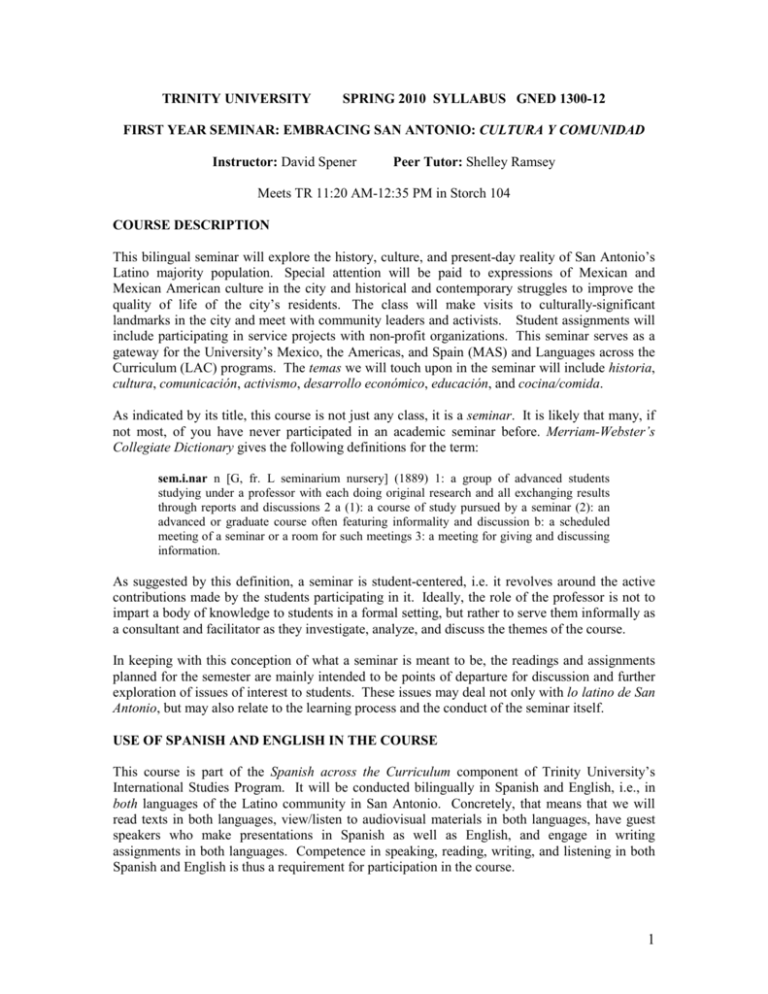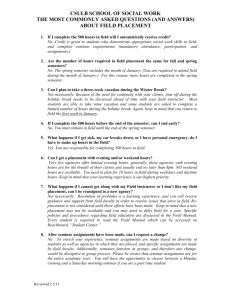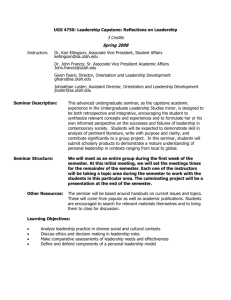Read the full syllabus here
advertisement

TRINITY UNIVERSITY SPRING 2010 SYLLABUS GNED 1300-12 FIRST YEAR SEMINAR: EMBRACING SAN ANTONIO: CULTURA Y COMUNIDAD Instructor: David Spener Peer Tutor: Shelley Ramsey Meets TR 11:20 AM-12:35 PM in Storch 104 COURSE DESCRIPTION This bilingual seminar will explore the history, culture, and present-day reality of San Antonio’s Latino majority population. Special attention will be paid to expressions of Mexican and Mexican American culture in the city and historical and contemporary struggles to improve the quality of life of the city’s residents. The class will make visits to culturally-significant landmarks in the city and meet with community leaders and activists. Student assignments will include participating in service projects with non-profit organizations. This seminar serves as a gateway for the University’s Mexico, the Americas, and Spain (MAS) and Languages across the Curriculum (LAC) programs. The temas we will touch upon in the seminar will include historia, cultura, comunicación, activismo, desarrollo económico, educación, and cocina/comida. As indicated by its title, this course is not just any class, it is a seminar. It is likely that many, if not most, of you have never participated in an academic seminar before. Merriam-Webster’s Collegiate Dictionary gives the following definitions for the term: sem.i.nar n [G, fr. L seminarium nursery] (1889) 1: a group of advanced students studying under a professor with each doing original research and all exchanging results through reports and discussions 2 a (1): a course of study pursued by a seminar (2): an advanced or graduate course often featuring informality and discussion b: a scheduled meeting of a seminar or a room for such meetings 3: a meeting for giving and discussing information. As suggested by this definition, a seminar is student-centered, i.e. it revolves around the active contributions made by the students participating in it. Ideally, the role of the professor is not to impart a body of knowledge to students in a formal setting, but rather to serve them informally as a consultant and facilitator as they investigate, analyze, and discuss the themes of the course. In keeping with this conception of what a seminar is meant to be, the readings and assignments planned for the semester are mainly intended to be points of departure for discussion and further exploration of issues of interest to students. These issues may deal not only with lo latino de San Antonio, but may also relate to the learning process and the conduct of the seminar itself. USE OF SPANISH AND ENGLISH IN THE COURSE This course is part of the Spanish across the Curriculum component of Trinity University’s International Studies Program. It will be conducted bilingually in Spanish and English, i.e., in both languages of the Latino community in San Antonio. Concretely, that means that we will read texts in both languages, view/listen to audiovisual materials in both languages, have guest speakers who make presentations in Spanish as well as English, and engage in writing assignments in both languages. Competence in speaking, reading, writing, and listening in both Spanish and English is thus a requirement for participation in the course. 1 A note on evaluation of students’ use of Spanish in course assignments: The minimum level of Spanish competence required for successful participation in the seminar is completion of Spanish 2302, “Intermediate Spanish II,” or its equivalent. Spanish will be used as one of the languages of instruction in the course, but this is NOT a Spanish course. Therefore, students’ use of Spanish in class, both orally and in writing, will be evaluated at the level of communicative competence (i.e., getting their message across), rather than in terms of style or grammatical correctness. Nevertheless, for written assignments, students should make use of their word processor’s Spanish grammar/spelling correction tool to avoid egregious errors that impede readers’ comprehension of their arguments. COURSE REQUIREMENTS Reading There are no books for you to buy for the course. Rather, you will be assigned a variety of published materials to read, evenly divided between English and Spanish-language publications. The instructor and peer tutor will make these available to you in a variety of ways throughout the semester. You should always complete readings in time to discuss them in class on the day for which they are assigned. The instructor will often post study/discussion questions on TLEARN to help you prepare for class. ALWAYS bring copies of assigned readings with you on the day they are to be discussed in class! Attendance and participation Class attendance is mandatory and your participation in discussions in the seminar needs to be active. Each class period you will be asked to discuss and debate issues that are raised in assigned materials. Come to every class prepared to both ask and answer questions about the assignments. In addition, there will be a number of local class field trips this semester that will take place outside regular class hours. These field trips are required; students that have unresolvable scheduling conflicts will be excused from participating and given an alternate activity to complete. Attendance and participation will account for 10 percent of your final grade in the course. On-line discussion forums To supplement our discussions in class, each week you will need to make two postings, one in English and one in Spanish, to an on-line discussion forum on TLEARN. Each posting should consist at a minimum of 150-200 words of critical, original comments about an assigned reading, a question posed by the instructor, or your response to postings or comments made in class by other students. You can also raise issues of your own as they pertain to the topic(s) of the forum. Your postings will be graded by the instructor for their relevance, originality, clarity, and demonstrated engagement with issues we raise in the seminar. Postings to on-line discussion forums will account for 15 percent of your final grade in the course. Audiovisual presentation As a member of team of two to three classmates, you will conduct research on a topic relevant to one or more of the themes of the seminar. You will present the findings of your research in a 2025 minute audiovisual presentation to the class. This presentation must be documented electronically so that it can be posted on the seminar’s T-Learn site. More detailed instructions for this assignment will be provided by the instructor. The audiovisual presentation will account 2 for 15 percent of your final grade in the course. Presentations will be made in class on April 27 and April 29. Short papers Your written assignments for the course will include two short papers/essays on a seminar-related topic. Papers should be 1,200-1,500 words long and incorporate findings you obtain from bibliographic research. The sources you rely upon will need to be properly referenced using American Sociological Association citation style. The first paper will be due on Monday, February 22 at 9:00 AM. The second paper will be due on Tuesday, April 20 at 12:00 noon. These papers may be written in English, but you will need to consult Spanish-language sources as part of your research. More detailed instructions for these assignments will be provided by the instructor. Each paper will account for 15 percent of your final grade in the course. Semester service-learning project Your biggest assignment for the seminar will be your semester service-learning project. For this project you will spend a minimum of 30 hours volunteering with a non-governmental organization (NGO) that serves the Latino community in San Antonio. At the end of the semester you will turn in a brief written report (approximately 1,500 words) and make a short presentation to the class, each of which summarizes your activities and accomplishments working for the organization. More detailed instructions for these assignments will be provided by the instructor. The semester service-learning project will account for 30 percent of your final course grade. GRADING Grades in the course will be given on a letter basis. The weighting of participation, the short essays, list-serve postings, service learning, and the final paper will be as follows: Attendance & participation Presentation Short papers Forum postings Semester project TOTAL 10% 15% 30% 15% 30% 100% There will be no grading "curve" in this course—each student will receive the grade s/he earns without regard to the class average. All assignment due dates are firm, and exceptions will be made only under extraordinary circumstances. Unless prior consent has been obtained from the instructor, grades on assignments turned in late will automatically be lowered one full letter. In addition, the grade given for written work in English will be lowered for spelling and punctuation errors, poor grammar, improper style, et cetera. Extra credit assignments may be offered from time-to-time throughout the semester and will be announced by the instructor. All assignments in this course are “pledged” assignments, as per the Trinity University Academic Honor Code (see http://www.trinity.edu/departments/academic_affairs/honor_code/). 3 VIAJE DE ESTUDIOS A MONTERREY, NUEVO LEÓN: UNIQUE EXTRA CREDIT OPPORTUNITY A significant theme that we will be exploring this semester is San Antonio’s links to communities in Mexico and the survival and reconstitution of Mexican cultural practices and traditions here. One of the most important Mexican communities to which San Antonio is connected is Monterrey, Nuevo León, Mexico’s third largest metropolis, located just 300 miles away. Every semester, Trinity’s Mexico, the Americas, and Spain (MAS) program takes a busload of students to Monterrey as part of an exchange program with universities there. The program involves attending academic meetings and social activities with Mexican students and faculty, as well as visiting significant historical and cultural sites, including places that illustrate Monterrey’s links to San Antonio. This trip is optional for students in our seminar, but you are strongly encouraged to attend and can earn extra course credit for doing so. The bus will leave Trinity on the afternoon of Wednesday, February 24 and return on the afternoon of Sunday, February 28. The approximate cost to students will be U.S. $200. Financial assistance may be available for those who require it. ÁLVAREZ SEMINAR AND OTHER CAMPUS AND COMMUNITY EVENTS THIS SEMESTER We are very fortunate that this semester the MAS Program is initiating what will be an annual seminar on Latino and Latin American issues. The theme of the Álvarez Seminar this semester is nuevas identidades en las Américas. The seminar will consist of several special events held on the Trinity campus (see attached flyer). Students in the Embracing San Antonio seminar will be able to earn extra course credit for attending any Álvarez seminar event and writing a 1-2 page synopsis/reaction paper that relates material presented at the event to topics covered in our class. In addition, there will be many other events taking place in the San Antonio community this semester that you may similarly attend for extra course credit. Information about these events will be provided by the instructor as it becomes available. CONTACT INFORMATION AND OFFICE HOURS FOR INSTRUCTOR AND PEER TUTOR Instructor: Dr. David Spener, Associate Professor of Sociology & Anthropology Office: 016 Storch Phone: 210 999 8562 Email: dspener@trinity.edu Office Hours: TR 10-11 AM, W 1-3 PM; Please make an appointment. Peer Tutor: Ms. Shelley Ramsey, Junior, Sociology major, Urban Studies minor Campus Address: Box 1745 Phone: 901 337-9683 Email: sramsey@trinity.edu Tutoring Hours: To be announced 4






